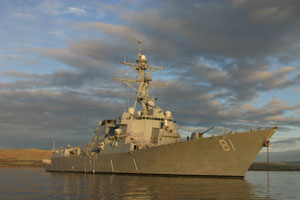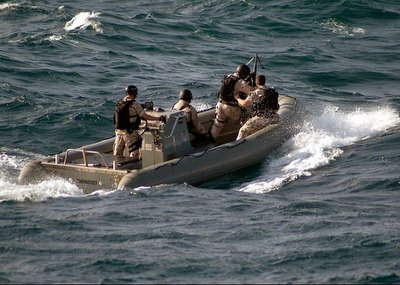
Reported here:
The US Navy Fifth Fleet command in Bahrain said late Saturday that one of its ships captured a group of suspected pirates Saturday afternoon in the Indian Ocean, about 85 kilometres off the central eastern coast of Somalia.USS Churchill seems to have done well by it name...
The Navy said that after receiving a report Friday morning of an attempted act of piracy from the International Maritime Bureau in Kuala Lumpur, the guided-missile destroyer USS Winston S. Churchill and other U.S. naval forces in the area located the the suspected vessel and reported its position.
'Churchill then shadowed the suspect pirate vessel through the night and into the morning hours of January 21,' the statement said.
At 8:03 a.m. local time Saturday, the Churchill attempted to make contact with the vessel over ship-to-ship radio, to no avail. With no response, the destroyer began aggressive manoeuvring in an attempt to stop the suspect vessel.
'The vessel continued on its course and speed,' said the Navy. 'At 11:31 a.m. Churchill fired warning shots. The vessel cut speed and went dead in the water.'
The statement said that at 1:02 p.m., the Churchill issued a warning via ship-to-ship radio that further actions would be taken to force the crew to respond to questioning and depart the vessel.
After additional warning shots, the crew of the suspected pirate vessel established communications by radio. Before 3 p.m., the master of the pirate vessel started sending members the crew to the Churchill.
When US sailors boarded the vessel and discovered small arms on board.
UPDATE: Navy photos of encounter from here
 The U.S. Navy’s Arleigh Burke-class guided missile destroyer USS Winston S. Churchill (DDG 81) follows a suspected pirate vessel in the Indian Ocean Jan. 21.
The U.S. Navy’s Arleigh Burke-class guided missile destroyer USS Winston S. Churchill (DDG 81) follows a suspected pirate vessel in the Indian Ocean Jan. 21. Dhow controlled by suspected pirates intercepted by the U.S. Navy destroyer USS Winston S. Churchill (DDG 81)
Dhow controlled by suspected pirates intercepted by the U.S. Navy destroyer USS Winston S. Churchill (DDG 81) Small boat under tow by a dhow operated by suspected pirates later apprehended by U.S. naval forces.
Small boat under tow by a dhow operated by suspected pirates later apprehended by U.S. naval forces. A boarding team from the Arleigh Burke-class guided missile destroyer USS Winston S. Churchill (DDG 81), approaches a suspected pirate vessel to conduct a boarding and inspection at sea, Jan. 21. All U.S. Navy photos by Chief Information Specialist Kenneth Anderson.
A boarding team from the Arleigh Burke-class guided missile destroyer USS Winston S. Churchill (DDG 81), approaches a suspected pirate vessel to conduct a boarding and inspection at sea, Jan. 21. All U.S. Navy photos by Chief Information Specialist Kenneth Anderson.Navy news release here:
...At 8:03 a.m. local time Jan. 21, Churchill began querying the pirate vessel over ship-to-ship radio. Churchill requested that the crew leave the vessel and board the two small boats the vessel had in tow. Following repeated attempts to establish communications with the vessel to no avail, Churchill began aggressive maneuvering in an attempt to stop the vessel. The vessel continued on its course and speed.An exciting few hours for all hands...
At 11:31 a.m. local time, Churchill fired warning shots. The vessel cut speed and went dead in the water.
At 1:02 p.m. local time, Churchill issued a warning via ship-to-ship radio that it would begin taking further actions to force the crew to respond to questioning and depart the vessel. At 2:21 p.m. local time, Churchill fired additional warning shots, and at that time the crew of the suspected pirate vessel established communications by radio and indicated that they would begin sending personnel to Churchill via their small boat in tow.
At 2:54 p.m. local time, the master of the pirate vessel started sending members of the crew to Churchill. U.S. Navy Sailors from Churchill then boarded the suspect vessel and discovered small-arms weapons on board.
USS Churchill has already been featured in one "urban legand" as set out here.
UPDATE2 (1/22/06): More details here -26 men captured, 16 Indians and 10 Somalis. The ship that reported a piracy attempt was fired on - "The Navy said it captured the dhow in response to a report from the International Maritime Bureau in Kuala Lumpur on Friday that said pirates had fired on the MV Delta Ranger, a Bahamian-flagged bulk carrier that was passing some 320 kilometers (200 miles) off the central eastern coast of Somalia." Some interesting military connection to the merchant vessel's name... More info on the MV Delta Ranger here.
UPDATE3: Piracy law refresher here:
Piracy is an international crime consisting of illegal acts of violence, detention, or depredation committed for private ends by the crew or passengers of a private ship or aircraft in or over international waters against another ship or aircraft or persons and property on board. (Depredation is the act of plundering, robbing, or pillaging.)Convention on the High Seas here.
In international law piracy is a crime that can be committed only on or over international waters (including the high seas, exclusive economic zone, and the contiguous zone), in international airspace, and in other places beyond the territorial jurisdiction of any nation. The same acts committed in the internal waters, territorial sea, archipelagic waters, or national airspace of a nation do not constitute piracy in international law but are, instead, crimes within the jurisdiction and sovereignty of the littoral nation.
Sea robbery is a term used to describe attacks upon commercial vessels in ports and territorial waters. Such attacks are, according to international law, not true acts of piracy but rather armed robberies. They are criminal assaults on vessels and vessel crews, just as may occur to truck drivers within a port area. Such attacks pose a serious threat to trade. The methods of these attacks have varied from direct force using heavy weapons to subterfuge in which the criminals have identified themselves on VHF radio as the national coast guard.
These maritime criminals are inclined to operate in waters where government presence is weak, often lacking in both technical resources and the political will to deal effectively with such attacks. International law permits any warship or government vessel to repress an attack in international waters. In a state's territorial waters, such attacks constitute an act of armed robbery and must be dealt with under the laws of the relevant coastal state. These laws seldom, if ever, permit a vessel or warship from another country to intervene. The most effective countermeasure strategy is to prevent criminals initial access to ports and vessels, and to demonstrate a consistent ability to respond rapidly and effectively to notification of such a security breach.
Acts of piracy can only be committed by private ships or private aircraft. A warship or other public vessel or a military or other state aircraft cannot be treated as a pirate unless it is taken over and operated by pirates or unless the crew mutinies and employs it for piratical purposes. By committing an act of piracy, the pirate ship or aircraft, and the pirates themselves, lose the protection of the nation whose flag they are otherwise entitled to fly.
To constitute the crime of piracy, the illegal acts must be committed for private ends. Consequently, an attack upon a merchant ship at sea for the purpose of achieving some criminal end, e.g., robbery, is an act of piracy as that term is currently defined in international law. Conversely, acts otherwise constituting piracy done for purely political motives, as in the case of insurgents not recognized as belligerents, are not piratical.
International law has long recognized a general duty of all nations to cooperate in the repression of piracy. This traditional obligation is included in the 1958 Geneva Convention on the High Seas and the 1982 LOS Convention, both of which provide: "[A]ll States shall cooperate to the fullest possible extent in the repression of piracy on the high seas or in any other place outside the jurisdiction of any State."
UPDATE4: Interesting deckload on the dhow...sandbags or what? Red arrows to cargo. Blue arrow to man with what appears to me to be a child riding piggy back.
 Red arrows to cargo bags(?) from above.
Red arrows to cargo bags(?) from above. 
Interesting...I say again.
UPDATE5: (1/23/06) Not too surprisingly, there is more to the dhow's story: "Sailors aboard the dhow told Navy investigators that pirates hijacked their vessel six days ago near Mogadishu and used it to stage attacks on merchant ships." source
UPDATE6: Update on story here, as Navy tries to sort the pirates form the non-pirates. (Hint: The ones with peg-legs, parrots, eye-patches and who can only say "Aarrgggh!" are probably pirates.)
UPDATE7: (1/24/06) PIrates got sorted:
The crew of the Norfolk-based destroyer Winston Churchill has returned 16 Indian crewmen to their ship and arrested 10 suspected Somali hijackers after foiling a piracy in the Indian Ocean...BZ Churchill!
...Since the Indian crew members all had passports and their sailing papers, and the Somalis did not, “it was pretty easy to find out who was who,” Leavitt said.
Besides, the Indian crew men were all talking and the Somalis were quiet, he said.
The dhow, which was carrying charcoal and general cargo, was filthy and roach-infested, said Petty Officer 1st Class Russell Allen, one of the Churchill sailors to go aboard.

No comments:
Post a Comment